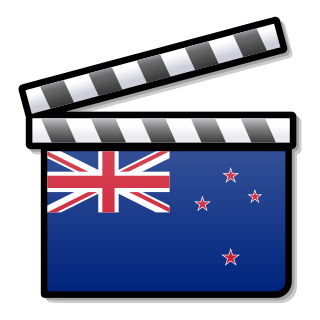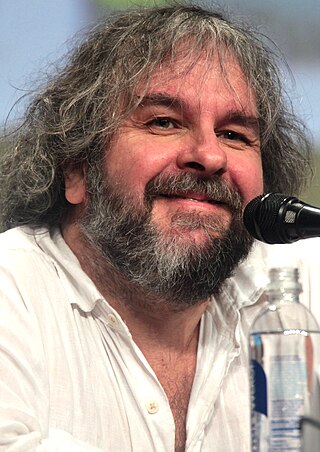Related Research Articles

New Zealand cinema can refer to films made by New Zealand-based production companies in New Zealand. However, it may also refer to films made about New Zealand by filmmakers from other countries. Due to the comparatively small size of its film industry, New Zealand produces many films that are co-financed by overseas companies.

Utu is a 1983 New Zealand film directed and co-written by Geoff Murphy; starring Anzac Wallace as Te Wheke, a warrior who sets out to get vengeance after British forces kill his people, Bruno Lawrence and Kelly Johnson. Sometimes described as "a Maori Western", Utu was reputed to have one of the largest budgets for a New Zealand film up until that time.
The Lord of the Rings is a series of three epic fantasy adventure films directed by Peter Jackson, based on the novel The Lord of the Rings by British author J. R. R. Tolkien. The films are subtitled The Fellowship of the Ring (2001), The Two Towers (2002), and The Return of the King (2003). Produced and distributed by New Line Cinema with the co-production of WingNut Films. The films feature an ensemble cast including Elijah Wood, Ian McKellen, Liv Tyler, Viggo Mortensen, Sean Astin, Cate Blanchett, John Rhys-Davies, Christopher Lee, Billy Boyd, Dominic Monaghan, Orlando Bloom, Hugo Weaving, Andy Serkis and Sean Bean.

Dame Frances Rosemary Walsh is a New Zealand screenwriter and film producer.

Geoffrey Peter Murphy was a New Zealand filmmaker, producer, director, and screenwriter best known for his work during the renaissance of New Zealand cinema that began in the second half of the 1970s. His second feature Goodbye Pork Pie (1981) was the first New Zealand film to win major commercial success on its soil. Murphy directed several Hollywood features during the 1990s, before returning to New Zealand as second-unit director on The Lord of the Rings film trilogy. Murphy was also a scriptwriter, special effects technician, schoolteacher and trumpet player at different times. He was married to Merata Mita, a film director, actor, writer.

Goodbye Pork Pie is a 1981 New Zealand comedy film directed by Geoff Murphy, co-produced by Murphy and Nigel Hutchinson, and written by Geoff Murphy and Ian Mune. The film was New Zealand's first large-scale local hit. One book described it as Easy Rider meets the Keystone Cops.
Ian Barry Mune is a New Zealand character actor, director, and screenwriter. His screen acting career spans four decades and more than 50 roles. His work as a film director includes hit comedy Came a Hot Friday, an adaptation of classic New Zealand play The End of the Golden Weather, and What Becomes of the Broken Hearted?, the sequel to Once Were Warriors.

The New Zealand Film Commission is a New Zealand government agency formed to assist with creating and promoting New Zealand films. It was established under the New Zealand Film Commission Act 1978.

David Charles Lawrence known as Bruno Lawrence was an English-born musician and actor, who was active in the industry in New Zealand and Australia.
Warren Lee Tamahori is a New Zealand filmmaker best known for directing the 1994 film Once Were Warriors, the 2001 film Along Came a Spider, and 2002's James Bond film Die Another Day.
John Bach is a British-born New Zealand actor who has acted on stage, television and film over a period of more than four decades. Though born in the United Kingdom, he has spent most of his career living and working in New Zealand.

Annie Collins is a film editor from New Zealand, best known for her work on The Return of the King. She was a film conformer on The Fellowship of the Ring, and moved up to assistant editor on The Two Towers. Her work with Jamie Selkirk helped earn The Return of the King an Oscar for Best Editing in 2004.
James William Arthur "Jamie" Selkirk is a film editor and producer who has worked primarily in New Zealand. He is particularly noted for his work on The Lord of the Rings film trilogy, which he co-produced with Peter Jackson. He received the Academy Award for Best Film Editing for the last film of the trilogy, The Return of the King (2003).
The production of The Lord of the Rings film series under Peter Jackson's direction was an enormous challenge, starting in 1997 and ending in 2004. Many earlier attempts had failed; most that had reached the screen were animations, and many filmmakers and producers had considered how to achieve the task and then set it aside. The film series as realized consists of three epic fantasy adventure films based on J. R. R. Tolkien's eponymous novel. They were produced by New Line Cinema, assisted by WingNut Films; the cinema versions appeared between 2001 and 2003, and the extended edition for home video in 2004. Development began in August 1997. The three films were shot simultaneously, entirely in Jackson's native New Zealand, from October 1999 until December 2000, with pick-up shots from 2001 to 2003.
Alun Robert Bollinger is a New Zealand cinematographer, who has worked on several Peter Jackson films, and many other films in New Zealand. He has also been a Director of Photography, including the second unit for Peter Jackson's trilogy The Lord of the Rings. He started as a trainee cine-camera operator for television with the New Zealand Broadcasting Corporation in 1966.

Sir Peter Robert Jackson is a New Zealand film director, screenwriter and producer. He is best known as the director, writer and producer of the Lord of the Rings trilogy (2001–2003) and the Hobbit trilogy (2012–2014), both of which are adapted from the novels of the same name by J. R. R. Tolkien. Other notable films include the critically lauded drama Heavenly Creatures (1994), the horror comedy The Frighteners (1996), the epic monster remake film King Kong (2005), the World War I documentary film They Shall Not Grow Old (2018) and the documentary The Beatles: Get Back (2021). He is the fourth-highest-grossing film director of all-time, his films having made over $6.5 billion worldwide.
Jabez Olssen is a New Zealand film and television editor who has worked extensively with director Peter Jackson.

Pork Pie is a 2017 New Zealand road comedy film written and directed by New Zealander Matt Murphy and produced by Tom Hern. The film is a remake of the 1981 movie Goodbye Pork Pie, the first New Zealand film to win a substantial local audience. The remake stars Dean O'Gorman, James Rolleston and Ashleigh Cummings as a trio of accidental outlaws who travel the length of New Zealand in a stolen orange New Mini. The film was scored by Jonathan Crayford.
Robert William Nigel Hutchinson was an English-born New Zealand film producer and commercial director best known for co-producing the 1981 film, Goodbye Pork Pie, with Geoff Murphy. Hutchinson also made a small cameo in the classic New Zealand film as a dairy farmer. He produced other films and television commercials, most recently Home by Christmas in 2010.
John Charles is a New Zealand film composer, conductor, and orchestrator. He created a number of musical works for the New Zealand cinema of the 1980s, 1990s and 2000s, including compositions for films such as Goodbye Pork Pie, Utu, The Quiet Earth, A Soldier's Tale or Spooked.
References
- ↑ "The Lord of the Rings Film Trilogy Production Notes", webpage of the Houghton-Mifflin company archived at Webcite from this original URL 2008-05-12.